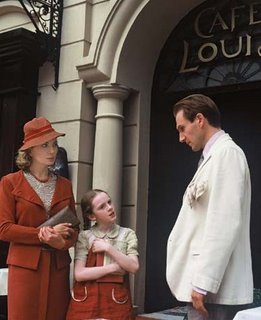
Following the death of producer Ismail Merchant, the last of the idiosyncratic films he made with James Ivory is a disappointing end to a long-stranding cinematic partnership that had become synonymous with modern melodrama. As with the best of their long list of films, The White Countess is peopled with rich characters in the midst of complicated relationships, romantic, social and political. The world they inhabit, 1930s Shanghai during the Sino-Japanese War in this case, is handsomely presented and evocative. The men won’t talk and the women won’t stop and someone will play tennis. Disappointments and misunderstandings battle yearnings and repressions. Unfortunately, as with more than a few of their thirty-odd collaborations, attention to detail is everywhere but in the story.
Currently drawing huge crowds to The Gate theatre in Dublin, Ralph Fiennes plays a retired American diplomat named Todd Jackson who left the government service when his family were killed in a house fire that left him blind. Having taken to shuffling through the shebeens of Shanghai, drinking his cares away, he befriends Mr. Matsuda (Hiroyuki Sanada), a mysterious Japanese man who warns him that a war is coming. One night, Jackson overhears a conversation in a bar involving the Countess Sofia Belinsky (Natasha Richardson), once a Russian royal who supports her exiled family by working as an escort girl. Later, he asks her to come on board as the hostess in his new bar, which he calls The White Countess in her honour. The club is a huge success, full every night of jazz-loving revellers and trendy revolutionaries. But Jackson finds himself romantically drawn to the Countess, and knows that he cannot act on his emotions. As a woman who no longer has to sell herself for money thanks to his attention, she’s just about ga-ga over him but likewise torn by some awful emotional trauma that just too terrible to even think about but probably involves her nasty family.
With a screenplay by Remains of the Day writer, novelist Kazuo Ishiguro, photography from ace cinematographer Christopher Doyle and an excellent cast including Richardson’s mother and aunt, Vanessa and Lynn Redgrave, the film had lots of potential, sadly never realised. The story drags, meandering around in flashback while waiting for something to happen. The ruminations of the characters become annoying and the monotony of the soap-opera formula becomes overwhelming. Fragments of story are picked up, turned over and dropped again in a careful manner, like slow-motion fidgeting.
Early on in the process of thinking up his dream, making it happen and losing it all again, Jackson says he wants the titular nightclub to be a place of elegance and charm that strikes the perfect note, “somewhere between the erotic and the tragic, like a woman.” In my scribbled notes there are four exclamation marks of emphasis alongside this transcribed snippet of dialogue, the full stop at the bottom of the last one breaking the paper. This thigh-endangering chatter is notable not only for it’s ponderous, novelised nothingness, but for being the last reaction, positive or negative, this monumentally boring film evoked. There was plenty more wandering inanity, lots of it heavily accented and awfully important-sounding but somewhere between the lovely animated insert and the peculiarly bloodless rain of Japanese bombs, I found myself having tuned out. I spent the last twenty five minutes thinking about lunch and the last fifteen eating it.








No comments:
Post a Comment